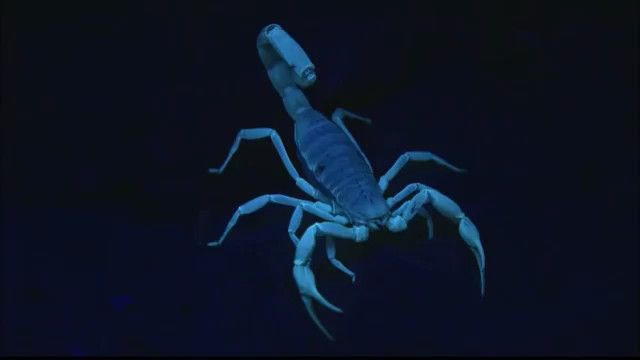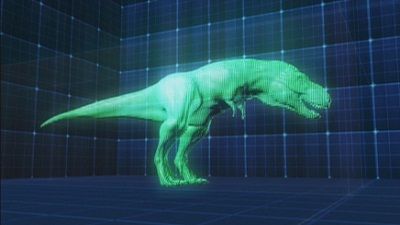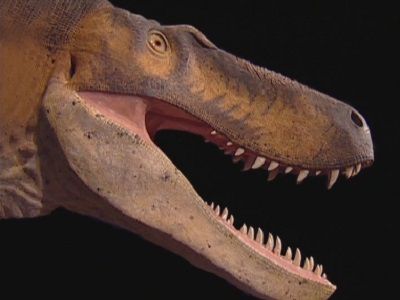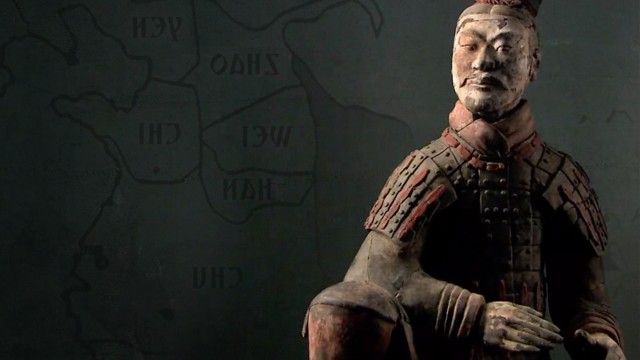The BEST episodes of Discovery Channel Documentaries season 2006
Every episode of Discovery Channel Documentaries season 2006, ranked from best to worst by thousands of votes from fans of the show. The best episodes of Discovery Channel Documentaries season 2006!
Documentaries that have been produced by the Discovery Channel.

#1 - The Scorpion's Tale
Season 2006 - Episode 32 - Aired 3/13/2006
Scorpions belong to the oldest land-based arachnides. Over 1800 different species are known to exist. Usually, they do not surpass the size of 10cm in length, but exceptions are know, such as the Emperor Scorpion (Pandinus imperator) which can grow up to become over 20cm in size. Scorpions mostly live at night and hide away during the day. They live mainly on insects but some species also feed on rodents and reptiles (lizards that are not big enough to be an opponent). Today humans threaten the existence of some species of scorpions. Take a look into the live of these amazing creatures!
#2 - Apollo 11: The Untold Story
Season 2006 - Episode 16 - Aired 7/24/2006
When Neil Armstrong first set foot on the moon in July 1969, Apollo 11 was hailed as the supreme triumph of American technology. But behind the flag waving lies a very different story: the untold account of how close the mission came to disaster. Now, nearly forty years later, men on that mission reveal what really happened on the first voyage to the moon, and unpublished NASA documents are made public for the first time. It's a tale of how primitive computer technology coupled with human errors and mechanical failures nearly caused the tragic loss of the crew. Apollo 11: The Untold Story reveals how, in deep space, the lunar module lost all contact with earth, coming within seconds of crashing. By running off course, the lunar module became critically low on fuel over inhospitable boulder-strewn lunar terrain. Apollo 11 astronaut Buzz Aldrin recalls how the astronauts believed they saw a UFO some 200,000 miles from earth, an event covered up at NASA's insistence for over thirty years. We discover how Mission Control's total computing power was the equivalent of one of today's laptops while the power of the lunar module was equal to a modern digital watch. Apollo 11 astronaut Buzz Aldrin reveals how a ballpoint pen saved him and Neil Armstrong from a lonely death stranded on the moon; and we discover how behind the scenes, so great were the fears that the crew wouldn't return that during the mission White House officials prepared a secret memorial speech for President Nixon to deliver to the world in the event of tragedy. Everybody thinks they know about Apollo 11: Neil Armstrong's "one small step for man", the stars and stripes planted firmly in the moon rock, the triumphant return to earth. This film, drawing on first hand testimonies from Buzz Aldrin, Apollo 11 flight director Gene Kranz and key personnel from the mission, reveals just how complicated that mission really was. For a group of pioneering men armed with experimental 1960s technology, Apollo 11 was
Watch Now:Amazon#3 - UFOs Over Illinois: Anatomy of a Sighting
Season 2006 - Episode 39 - Aired 4/22/2006
The focus of this video is indeed "the anatomy of a sighting," the process by which investigators went about studying this case in the absence of any video or significant photographic evidence. A trucker first spotted the UFO just before 4 AM on January 5, 2000, and alerted the local police dispatcher. Then, as the object made its way south-southwest across the Illinois skies, police officers from the localities of the corresponding towns reported their own sightings of the object. We have the tape of these calls to the dispatcher. The final witness was a teacher traveling to work just before 7 AM. While witness testimony naturally differed slightly (the first and last witnesses saw a more box-like structure, whereas the policemen described the object as having the shape of an arrowhead), important correlations did exist in their individual descriptions.
#4 - Addicted to Oil: Thomas L. Friedman Reporting
Season 2006 - Episode 38 - Aired 6/24/2006
Explores how America's addiction to oil funds terrorists, has a visual model of the global heating, explores several alternative energy sources and the current administrations attitude towards energy.
#5 - Mount St. Helens: Forecast for Disaster
Season 2006 - Episode 37 - Aired 7/29/2006
Is Washington's Mount St. Helens going to blow again? This new documentary looks at scientific efforts to collect valuable information that might provide advance warning of a volcanic eruption, the last of which happened in 1980. "Feasting on Asphalt" (9 p.m., Food Network): Before people needed to conquer, build, shop and commute, they needed to eat. That's why there are roads -- at least, according to Alton Brown. So this intrepid culinary investigator hits the road with his motorcycle to find what's on the menu. "Feasting on Asphalt," which premieres tonight, is a four-episode series documenting Brown's quest. Loosely following Route 50, Brown and crew will meander from Savannah, Ga., across the bayous of Louisiana, over the hill country of Texas, across the high dusty dessert, then west to Las Vegas and the California coast. Brown ("Good Eats" and "Iron Chef America") will be eating on the go at every level, from foraging in the forest to hitting roadside diners -- not to mention churches, VFW halls, and homes of folks nice enough to offer a weary traveler a meal.
#6 - The Mystery of the Human Hobbit
Season 2006 - Episode 36 - Aired 3/4/2006
#7 - Global Warming: What You Need to Know with Tom Brokaw
Season 2006 - Episode 35 - Aired 7/2/2006
Global warming is the rise in the average temperature of Earth's atmosphere and oceans since the late 19th century and its projected continuation. Since the early 20th century, Earth's mean surface temperature has increased by about 0.8 °C (1.4 °F), with about two-thirds of the increase occurring since 1980. Warming of the climate system is unequivocal, and scientists are more than 90% certain that it is primarily caused by increasing concentrations of greenhouse gases produced by human activities such as the burning of fossil fuels and deforestation. These findings are recognized by the national science academies of all major industrialized nations
#8 - Egypt's New Tomb Revealed
Season 2006 - Episode 34 - Aired 6/23/2006
A new tomb is found in Egypt's Valley of the Kings, with 28 jars and 7 coffins. What lies sealed inside the jars? Are there mummies in the coffins? And, if so, are they tied to King Tut's tomb?
#9 - King Tut's Mystery Tomb Opened
Season 2006 - Episode 33 - Aired 7/9/2006
#10 - Greatest Fireworks on Earth
Season 2006 - Episode 31 - Aired 8/1/2015
Fireworks are used to celebrate important events. Captured in high-definition video, viewers experience a high-rolling fireworks extravaganza in a number of events in destinations around the world.
#11 - What Lies Below
Season 2006 - Episode 29 - Aired 10/28/2006
A team of cave explorers, each with their own speciality, travel to any given location on planet Earth to explore and document the millions of uncharted miles of caves that rest beneath our feet, much of which has never been seen or tread on by mankind.
#12 - Saving Ronald Reagan
Season 2006 - Episode 28 - Aired 10/3/2006
On March 30 1981, as Ronald Reagan paused to wave at reporters outside the Washington Hilton Hotel, six shots rang out. Instinctively special agent Jerry Parr hustled the seemingly unhurt president into his waiting limo, but as the car sped away, Reagan coughed up blood and accused Parr of breaking one of his ribs. At the George Washington Hospital, Dr. Ben Aaron looked at the blood flowing out of Reagan's chest, unaware of the bullet lodged just 3 inches from his heart, and faced the biggest decision of his life. If he performed an operation on the president's chest, he risked killing a 70-year-old man whose body was in shock and might not be able to cope with the trauma. But if he waited, a major blood vessel might burst, which could also kill him.
#13 - China's Mega Dam
Season 2006 - Episode 43 - Aired 1/28/2006
The Three Gorges Dam on the Yangtze River in China is the largest public works project in the history of mankind. Its size, scale and potential are unprecedented in engineering history. Join Discovery Channel cameras - granted exclusive access to the site - as they document the dramatic effect this massive construction project will have on the surrounding countryside.
#14 - Gold Diggers: World's Biggest Bank Robbery
Season 2006 - Episode 26 - Aired 4/8/2006
In 2005, 168,000,000 Brazilian Real (almost 80,000,000 US dollars) was stolen from a Brazilian bank, making it the biggest peace-time robbery in history. It was perhaps the most audacious bank heist ever. The gang were widely hailed as folk-heroes. The crime was technically brilliant, and they disappeared without trace. Police were stunned by what they found – and so was the Discovery audience. The gang had burrowed in from over a block away, creating a tunnel that was wood-panelled, strip lit – and even air-conditioned! They destroyed all forensics at the scene, and only took bank notes that were untraceable. Not a single alarm was triggered. By the time the theft was noticed, the gang had disappeared into thin air...

#15 - T. Rex: New Science, New Beast
Season 2006 - Episode 24 - Aired 11/26/2006
Delve deep into the world of TYRANNOSAURUS REX (by studying "Sue") as we revisit the past to rewrite the history of this hulking beast. Discard your previous assumptions and explore the latest T-rex discoveries to reveal the true history, biology and mechanics of this massive creature.

#16 - The Mystery Dinosaur
Season 2006 - Episode 23 - Aired 7/11/2012
The documentary tells the story of Jane, a pristine dinosaur skeleton unearthed in Southeastern Montana by a group of mostly amateur fossil hunters from the Burpee Museum of Natural History in Rockford, where the dinosaur is now prominently displayed. Jane was built to kill. Twenty-two feet long and 7 1/2 feet high at the hip, the dinosaur during its day tipped the scales at about 1,500 pounds. It had 72 serrated teeth.
#17 - Nostradamus: The Truth
Season 2006 - Episode 21 - Aired 5/19/2006
Documentary examining the prophecies of the ancient seer. Were Nostradamus' insights really as specific and lucid as some people have claimed?
#18 - Revealing Mars
Season 2006 - Episode 20 - Aired 3/10/2006
On August 12, 2005 NASA launched Mars Reconnaissance Orbiter designed to explore the Red Planet from the orbit. The M.R.O. will make a more comprehensive inspection of Mars than any previous mission, examining landscape details as small as a coffee table with the most powerful telescopic camera ever sent to orbit of a foreign planet. This 47 min. long documentary will walk you through the orbiter's scientific payload, illustrate how each instrument works and give you a sense of the high-quality images and data these tools will produce by comparing them to tools used for the investigation of the atmosphere and geology of Earth.

#19 - First Emperor: The Man Who Made China
Season 2006 - Episode 19 - Aired 1/29/2006
The First Emperor: The Man Who Made China follows the rise and fall of Chin Shi Huang, China’s legendary first emperor. The Discovery Channel was allowed unprecedented access to Emperor Chin’s underground burial complex that spans over seven square miles. The team employs cutting edge technology such as ground-penetrating radar combined with CGI to illustrate the design and layout of the largest unopened tomb in the world.
#20 - Europa: Mystery of the Ice Moon
Season 2006 - Episode 42 - Aired 8/1/2006
After the Jupiter mission, NASA scientists now believe that life forms exist on EUROPA, the giant frozen moon orbiting Jupiter. Using 3-D mapping imagery, scientists reveal their hypotheses and exclusive footage of what it might be like to take the 7-year voyage to discover the climate and origins of this mysterious moon. Viewers are taken on an exploration journey as three NASA scientists venture to a cold desolate glacier in the Canadian Yukon Territory. This is the only known environment that is similar to EUROPA's icy surface, and gives scientists an idea of the monumental yet exciting possibilities that come with ice exploration. Oceans explorer Mike Cameron makes a special appearance (James Cameron's brother who created vital technology on James Cameron's explorations of "Titanic" and "Bismarck"), as he creates a working model of a probe concept to extract scientific data from the Earth's surface that could one day explore EUROPA's oceans. Cameron's camera technology and robots survived extraordinary conditions to some 15,000 ft. below the Earth's ocean surface inspire him to imagine what it would take to bore through many miles of ice and into this icy moon's ocean that just might contain life.
#21 - Catching the Comet
Season 2006 - Episode 15 - Aired 1/22/2006
We’ve watched them streak across the sky for centuries, but what - beyond their sometimes extraordinary and fleeting beauty - do we really know about comets? Follow a breakthrough mission to demystify and - for the very first time - capture the contents of a comet. Premiering Sunday, January 22 at 7 p.m. ET/8 p.m. PT on Discovery Channel, Catching the Comet follows the exploration of a comet by devising an innovative way to bring one home. This one-hour special follows the Stardust mission, the first U.S. space project dedicated to the exploration of a comet, and the first robotic exercise designed to return comet dust to Earth. Last year a NASA spacecraft flew past the comet, dubbed Wild 2, to collect comet dust - particles smaller than a grain of sand - in a specially designed high-tech capsule. On January 15, 2006, that capsule will fall to Earth in the Utah desert. In the middle of the night, at a restricted location on a U.S. army base, waiting helicopters will pluck the canister from its landing spot and transport it to a specially prepared lab for analysis. What will the experiments reveal about this mysterious dust - and how will this new discovery inform our understanding of comets? In Catching the Comet, follow the 4.8-billion kilometre Stardust operation, from mission control to the preparations for the capsule’s return and its actual fall to Earth. What do scientists know about comets already? Comets are like “cosmic refrigerators” - so cold, untouched and remote that they provide clues to the physical and chemical conditions of the solar system as it existed 4.6 billion years ago. That old stuff stuck at the back of the “cosmic fridge” is best described as frozen primordial ooze from the time the planets and Sun were formed. When scientists observe comets today, they are reaching back into the past and learning about the origin of the solar system and perhaps the beginning of life on Earth. But these balls of gas, dust and ice cont